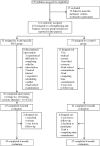Task-Specific Balance Training Improves the Sensory Organisation of Balance Control in Children with Developmental Coordination Disorder: A Randomised Controlled Trial
- PMID: 26864309
- PMCID: PMC4750073
- DOI: 10.1038/srep20945
Task-Specific Balance Training Improves the Sensory Organisation of Balance Control in Children with Developmental Coordination Disorder: A Randomised Controlled Trial
Abstract
Sensory organisation of balance control is compromised in children with developmental coordination disorder (DCD). A randomised controlled trial involving 88 children with DCD was conducted to evaluate the efficacy of a task-specific balance training (functional-movement training, FMT) programme in improving balance deficits in a DCD population. The DCD participants were randomly assigned to either a FMT group or a control group. The FMT group received two training sessions/ week for 3 months. Measurements of the participants' sensory organisation (somatosensory, vestibular and visual ratios), balance and motor proficiency (Movement Assessment Battery for Children, MABC scores) and center of pressure sway velocity (Unilateral Stance Test, UST scores) were taken at baseline, immediately after FMT and 3 months after FMT. The FMT group showed greater improvements than the controls in somatosensory ratio at 3 and 6 months (all P < 0.001), but the within-group changes were not significant (P > 0.05). The results of both the MABC and the UST also indicated that the balance performance of the FMT group was significantly better than that of the control group at 3 and 6 months (all P < 0.05). Task-specific balance training was found to marginally improve the somatosensory function and somewhat improve the balance performance of children with DCD.
References
-
- American Psychiatric Association. Diagnostic and Statistical Manual of Mental Disorders, 4th ed. (American Psychiatric Association, Washington, DC, 1994).
-
- Macnab J. J., Miller L. T. & Polatajko H. J. The search for subtypes of DCD: Is cluster analysis the answer? Hum. Mov. Sci. 20, 49–72 (2001). - PubMed
-
- Grove C. R. & Lazarus J. A. C. Impaired re-weighting of sensory feedback for maintenance of postural control in children with developmental coordination disorder. Hum. Mov. Sci. 26, 457–476 (2007). - PubMed
-
- Fong S. S. M., Lee V. Y. L. & Pang M. Y. C. Sensory organization of balance control in children with developmental coordination disorder. Res. Dev. Disabil. 32, 2376–2382 (2011). - PubMed
-
- Fong S. S. M. et al. Motor ability and weight status are determinants of out-of-school activity participation for children with developmental coordination disorder. Res. Dev. Disabil. 32, 2614–2623 (2011). - PubMed
Publication types
MeSH terms
LinkOut - more resources
Full Text Sources
Other Literature Sources


